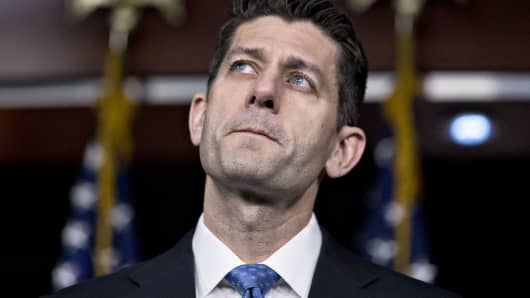President Trump and Congress may have put the repeal of Obamacare off for several months, but the escalating cost of healthcare is not going to go away.
While they debate how to address the failing law and its focus on insurance coverage, our political leaders can embark on a separate initiative to reduce costs by modernizing our health-care system and embracing sound business principles.
As someone who has brought efficiency to health-care delivery for more than three decades, I suggest these seven ideas to bring about effective cost containment:
- MANDATE MEDICAL SMART CARDS Anyone going to a hospital or physician's office is frustrated when they must fill out multiple forms asking the same questions. Patients should be given a smart card that captures personal information, tracks all medications, tests, conditions and treatments. A smart card would have a thumb print ID so only a patient could release the records. The same technology would work with a personal cellphone. Either would comply with federal privacy laws. It would mimic banking and other EZ pay apps that retain privacy.
- STANDARDIZE REIMBURSEMENT SYSTEMS Health-care billing and collections accounts for 10 to 15 percent of all health care costs. Costs could be reduced by 10 to 12 percent if we would use an "intelligent" ATM or credit card type system that would pre-approve care, calculate payments based on coverage and pay the provider immediately.
Each payer could connect to the system and download benefits, co-pays, coverage and payment amounts for each provider. This would eliminate the wasted time spent manually obtaining approvals by phone or mail and the delay in payments to providers. The technology and software billing systems are already available to standardize payment systems. Currently insurance companies have no incentive to quickly process payment. For 10 cents a transaction, a physician could be paid, for example, identical to credit card processing.
- ELIMINATE FRAUD It is estimated that fraud accounts for over $150 billion per year, according to "Stop Paying the Crooks," a book by Newt Gingrich and Jim Frogue. Fraud occurs when fake providers utilizing fake patient names bill the government. In South Florida, crooks are shifting from selling illegal drugs to conducting medical billing fraud.
Their rationale is that there is more money to be made and as there is no enforcement. If we outsource payments with the above mentioned smart cards, it would prevent such fraud because like credit card companies, payments are rarely made to phony vendors. If we don't utilize smart cards, American Express or Visa could be utilized to manage payments in the system to make sure no phony vendors are getting paid in the Medicare and Medicaid systems.
- EXPAND TELEMEDICINE Congress should adopt legislation to allow payment for telemedicine across state lines. Telemedicine creates labor on demand, which means the physician is paid only if they are called upon to provide treatment. Kaiser, for example, has adopted this model and 52 percent of patient visits or 59 million patients were treated via online portals, virtual visits or the health systems apps in 2015. Kaiser California costs are 50 percent less than the rest of the country.
- INNOVATION AND RESEARCH Congress should streamline and cut the bureaucratic red tape so that these drugs and therapies can hit the markets faster. Currently the FDA is in the business of zero risk tolerance which is not good for patients who want new drugs coming on the market.
This would not only save lives, but also reduce the cost of health care.Alzheimer's disease, for example, will cost the federal budget $175 billion in 2017 in Medicaid and Medicare costs as one in 10 seniors are afflicted by the disease, according to the Alzheimer's Association. Investing at least $2 billion annually in brain science research is an effective return on investment and improves the lives of the growing number of patients afflicted by Alzheimer's.
- MANDATE PRICE TRANSPARENCY In health care - the buyer (patient) does not pay and the seller (physician) does not know the price for services. It is the opposite of a free market. Consumers can't save money if they don't know the price. Congress could require that medical providers offer the price of their services online so consumers could shop for a service they could afford under their insurance coverage. No shopper buys groceries without knowing what the price is for each item, and that shouldn't be any different when purchasing medical services.
- ELIMINATE ALL MEDICALLY UNNECESSARY PROCEDURES AND TESTS At least 40 percent of U.S. health care costs are for unnecessary medical procedures and tests, according to Gallup and the Institute of Medicine. There are three major reasons for unnecessary care: defensive medicine, duplicate tests, and medicine ordered to please the patient or family member.
Defensive medicine occurs when physicians orders more tests or procedures for the sole purpose of avoiding a malpractice lawsuit. Gallup in 2010 reported that 26 percent of all health care costs were related to defensive medicine. A better system would be to abolish malpractice for a no-fault system similar to workers compensation. Patients would be compensated quickly and doctors would freely admit mistakes and develop best practices. It would create a savings of $650 billion annually.
Physicians also routinely order tests that have already been performed by other physicians for the same patient. By creating a personal patient record and smart card, all physicians will be able to share results and reduce the occurrence of duplicating services.
It's time for our nation's policymakers to rise above the noise and look at what's really impeding efficiencies in health care. It's time to reverse course and modernize our health care system so it can have as fine a reputation as the medical care offered by our providers.
Commentary by Richard L. Jackson, chairman and CEO of Atlanta-based Jackson Healthcare, one of the largest health-care staffing and technology companies in the U.S.
For more insight from CNBC contributors, follow @CNBCopinion on Twitter.


